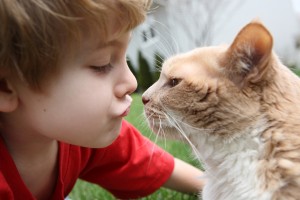
Pets have long played an important role in the American household. I recently read “Pets in America” by Katherine Greer. Critics acclaim her book to be entertaining and informative, it being a portrait of Americans’ relationship with the cats, dogs, birds, fishes, rodents and other animals we call our own. The author says over 60% of U.S. households have pets.
How familiar you are with the concept of having a pet is often determined by whether your family had pets when you were a child. If you had pets, it may be an easy transition for you in accepting your child’s desires for having one. If you did not have any pets growing up, it may be that you don’t want to start now, or you’re really eager to start a new family tradition as your kids are constantly asking you to give in and get them one.
Children are constantly exposed to the concept of having a pet. Most of their friends may have pets, schools may have “bring your pet to school day” (show and tell) and of course, the television is inundated with all sorts of advertising for pet food, pet care and family life with pets.
There are things to consider when choosing to have a pet become a member of your household however. Questions to discuss as a family unit. Who will be its primary caregiver? Are the duties to be shared? How involved does your child want to be with its care? Is your child mature enough to care for a pet?
Children will eagerly exclaim that they will happily become the caretaker of the new family pet, but most of us know how that turns out. Mom and/or Dad inherit all the responsibility after a time. Having a young pet, such as a puppy or a kitten can be like having another child in the family. They require quite a bit of care and attention until they are a little older and more independent. The end result being, you now have a special new member of the family.
What is the value in having a family pet? How will having a pet benefit your child? Pets that require less maintenance such as a fish or hamster in a cage, can teach a child responsibility. They require feeding and caring for their environment, but don’t need to be walked and played with. Puppies and kittens add a playful element to the home and as they mature, bond with the family. Every pet has a different personality and can become a treasured companion for the family. There can be such an overt expression of love and affection between you, your children and the family pet. Children learn to express love and receive love through having pets that is free of judgment and expectations.
There are so many ways in which a pet may enhance a family. Having a clear in-depth conversation with your children regarding your expectations and the responsibilities involved, is important before any pet is welcomed into your home.
Please feel free to comment.
© 2014. Sharon Ballantine. All Rights Reserved.

